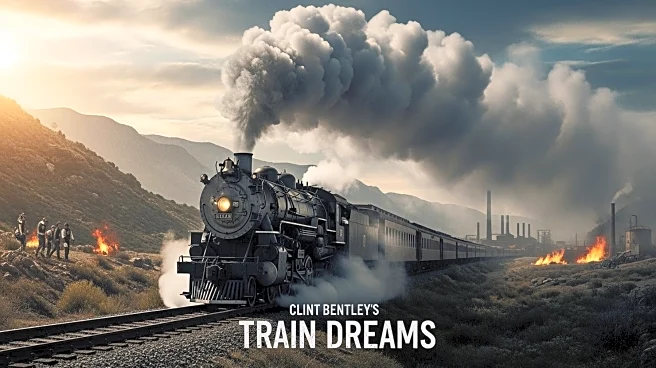What's Happening?
Clint Bentley's film 'Train Dreams,' based on Denis Johnson's novella, is gaining attention at the BFI London Film Festival. The movie stars Joel Edgerton as Robert Grainier, a lumberman in the Pacific Northwest during the early 20th century, capturing
the transition into the industrial age. Felicity Jones plays Gladys, Grainier's love interest, alongside a cast including William H. Macy and Kerry Condon. Bentley adapted the novella after being approached by producers who saw his previous work, 'Jockey.' The film's cinematography by Adolpho Veloso and its universal themes have resonated with audiences, highlighting humanity's disconnection from nature and the impact of technology.
Why It's Important?
The film 'Train Dreams' offers a reflective look at America's industrial past, emphasizing themes of nature and technology's influence on human life. It provides a narrative that resonates with contemporary audiences, exploring the balance between progress and environmental stewardship. The film's portrayal of historical characters and their struggles mirrors modern societal challenges, making it relevant to discussions on sustainability and technological advancement. By connecting past and present, 'Train Dreams' encourages viewers to consider their relationship with nature and the consequences of industrialization.
What's Next?
Following its festival screenings, 'Train Dreams' is set for a limited release in U.S. and UK cinemas on November 7, with a Netflix debut on November 21. The film's themes may spark discussions on environmental policy and the role of technology in modern life. As audiences engage with the film, it could influence cultural conversations about sustainability and historical preservation. The film's release may also impact the careers of its cast and crew, potentially leading to further projects that explore similar themes.
Beyond the Headlines
Beyond its narrative, 'Train Dreams' raises ethical questions about humanity's impact on the environment and the cultural shifts brought by industrialization. The film's exploration of historical and contemporary issues may contribute to broader debates on climate change and technological dependency. It challenges viewers to reflect on their personal and collective roles in shaping the future, offering a cinematic pause to consider the choices that define societal progress.


















